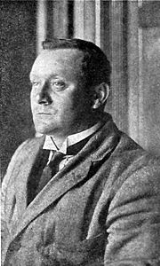
John F. Schrank
Encyclopedia
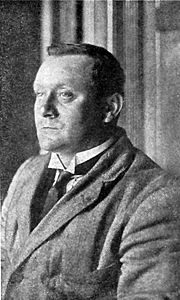
Bar (establishment)
A bar is a business establishment that serves alcoholic drinks — beer, wine, liquor, and cocktails — for consumption on the premises.Bars provide stools or chairs that are placed at tables or counters for their patrons. Some bars have entertainment on a stage, such as a live band, comedians, go-go...
from New York
New York
New York is a state in the Northeastern region of the United States. It is the nation's third most populous state. New York is bordered by New Jersey and Pennsylvania to the south, and by Connecticut, Massachusetts and Vermont to the east...
, best known for his attempt to assassinate former U.S. President Theodore Roosevelt
Theodore Roosevelt
Theodore "Teddy" Roosevelt was the 26th President of the United States . He is noted for his exuberant personality, range of interests and achievements, and his leadership of the Progressive Movement, as well as his "cowboy" persona and robust masculinity...
on October 14, 1912 in Milwaukee, Wisconsin
Milwaukee, Wisconsin
Milwaukee is the largest city in the U.S. state of Wisconsin, the 28th most populous city in the United States and 39th most populous region in the United States. It is the county seat of Milwaukee County and is located on the southwestern shore of Lake Michigan. According to 2010 census data, the...
.
Biography
Schrank was born in BavariaBavaria
Bavaria, formally the Free State of Bavaria is a state of Germany, located in the southeast of Germany. With an area of , it is the largest state by area, forming almost 20% of the total land area of Germany...
; he emigrated
Emigration
Emigration is the act of leaving one's country or region to settle in another. It is the same as immigration but from the perspective of the country of origin. Human movement before the establishment of political boundaries or within one state is termed migration. There are many reasons why people...
to America
United States
The United States of America is a federal constitutional republic comprising fifty states and a federal district...
at the age of 9. His parents died soon after leaving Schrank to work for his uncle, a New York tavern
Tavern
A tavern is a place of business where people gather to drink alcoholic beverages and be served food, and in some cases, where travelers receive lodging....
owner and landlord
Landlord
A landlord is the owner of a house, apartment, condominium, or real estate which is rented or leased to an individual or business, who is called a tenant . When a juristic person is in this position, the term landlord is used. Other terms include lessor and owner...
. Upon their deaths Schrank's aunt and uncle left him these valuable properties from which it was expected he could live a quiet and peaceful life. But Schrank was heartbroken not just because he had lost his second set of parents but because his first and only girlfriend Emily Ziegler had died in the General Slocum
General Slocum
The PS General Slocum was a passenger steamboat built at Brooklyn, New York, in 1891. The General Slocum was named for Civil War officer and New York Congressman Henry Warner Slocum. She operated in the New York City area as an excursion steamer for the next thirteen years under the same ownership...
disaster on New York's East River
East River
The East River is a tidal strait in New York City. It connects Upper New York Bay on its south end to Long Island Sound on its north end. It separates Long Island from the island of Manhattan and the Bronx on the North American mainland...
.
Schrank sold the properties, and drifted around the East Coast
East Coast of the United States
The East Coast of the United States, also known as the Eastern Seaboard, refers to the easternmost coastal states in the United States, which touch the Atlantic Ocean and stretch up to Canada. The term includes the U.S...
for years. He became profoundly religious
Religion
Religion is a collection of cultural systems, belief systems, and worldviews that establishes symbols that relate humanity to spirituality and, sometimes, to moral values. Many religions have narratives, symbols, traditions and sacred histories that are intended to give meaning to life or to...
, and a fluent Bible
Bible
The Bible refers to any one of the collections of the primary religious texts of Judaism and Christianity. There is no common version of the Bible, as the individual books , their contents and their order vary among denominations...
scholar whose debating skills were well-known around his neighborhood's watering holes and public parks. He wrote spare and vivid poetry
Poetry
Poetry is a form of literary art in which language is used for its aesthetic and evocative qualities in addition to, or in lieu of, its apparent meaning...
. He spent a great deal of time walking around city streets at night. He caused no documented trouble.
Assassination attempt
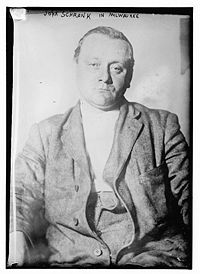
United States presidential election, 1912
The United States presidential election of 1912 was a rare four-way contest. Incumbent President William Howard Taft was renominated by the Republican Party with the support of its conservative wing. After former President Theodore Roosevelt failed to receive the Republican nomination, he called...
campaign was characterised by a serious split in the Republican Party between the conservative wing under President William Howard Taft
William Howard Taft
William Howard Taft was the 27th President of the United States and later the tenth Chief Justice of the United States...
and the liberal/reform wing under ex-President Theodore Roosevelt. After a bitter confrontation at the Republican Convention, Taft won renomination. Roosevelt led a bolt of his followers, who held a convention and nominated him for President on the ticket of the Progressive Party
Progressive Party (United States, 1912)
The Progressive Party of 1912 was an American political party. It was formed after a split in the Republican Party between President William Howard Taft and former President Theodore Roosevelt....
, nicknamed the "Bull Moose Party". Taft and his supporters attacked Roosevelt for being power-hungry, and seeking to break the tradition that U.S. Presidents only serve up to two terms in office.
On October 14, 1912, while Theodore Roosevelt was campaigning in Milwaukee, Wisconsin, Schrank attempted to assassinate him.
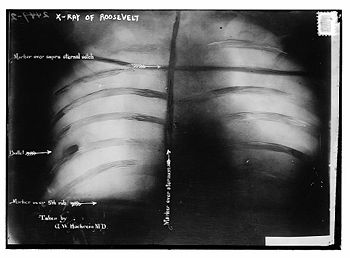
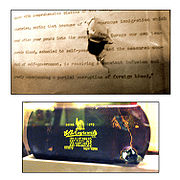
Politics
Politics is a process by which groups of people make collective decisions. The term is generally applied to the art or science of running governmental or state affairs, including behavior within civil governments, but also applies to institutions, fields, and special interest groups such as the...
so flared that he would attempt to kill Roosevelt. It is known that he was an opponent of a sitting President's ability to seek a third term in office.
According to documents found on Schrank after the attempted assassination
Assassination
To carry out an assassination is "to murder by a sudden and/or secret attack, often for political reasons." Alternatively, assassination may be defined as "the act of deliberately killing someone, especially a public figure, usually for hire or for political reasons."An assassination may be...
, Schrank had written that he was advised by the ghost of William McKinley
William McKinley
William McKinley, Jr. was the 25th President of the United States . He is best known for winning fiercely fought elections, while supporting the gold standard and high tariffs; he succeeded in forging a Republican coalition that for the most part dominated national politics until the 1930s...
in a dream to avenge his death, pointing to a picture of Theodore Roosevelt.
Roosevelt was at the Gilpatrick Hotel at a dinner provided by the hotel's owner, a supporter. The ex-President was scheduled to deliver a speech at the Milwaukee Auditorium. News had circulated that Roosevelt was at the hotel, and Schrank (who had been following Roosevelt from New Orleans to Milwaukee) went to the hotel. The ex-President had finished his meal, and was leaving the hotel to enter his car when Schrank acted.
Schrank did shoot Roosevelt, but the bullet lodged in Roosevelt's chest only after hitting both his steel eyeglass case and a 50-page copy of his speech he was carrying in his jacket. Roosevelt decided the bullet could not have penetrated to his lung because he coughed no blood and, declining suggestions that he go to the hospital, delivered his scheduled speech. He spoke for ninety minutes, but sometimes managed no more than a whisper. His opening comments to the gathered crowd were:
Afterwards, doctors determined that he was not seriously wounded and that it would be more dangerous to attempt to remove the bullet than to leave it in his chest. Roosevelt carried it with him until he died. In later years, when asked about the bullet inside him, Roosevelt would say, "I do not mind it anymore than if it were in my waistcoat pocket."
Both Taft and Democratic nominee Woodrow Wilson
Woodrow Wilson
Thomas Woodrow Wilson was the 28th President of the United States, from 1913 to 1921. A leader of the Progressive Movement, he served as President of Princeton University from 1902 to 1910, and then as the Governor of New Jersey from 1911 to 1913...
suspended their own campaigning until Roosevelt recovered and resumed his. Roosevelt made only two more speeches in the campaign. Although Roosevelt won more votes and electoral votes than Taft, Wilson bested both of them and won the Presidency.
Schrank maintained, later, that he had nothing against the man himself, and he did not intend to kill 'the citizen Roosevelt', but rather 'Roosevelt, the third-termer.' He claimed to have shot Roosevelt as a warning to other third-termers, and that it was the ghost of William McKinley
William McKinley
William McKinley, Jr. was the 25th President of the United States . He is best known for winning fiercely fought elections, while supporting the gold standard and high tariffs; he succeeded in forging a Republican coalition that for the most part dominated national politics until the 1930s...
that told him to perform the act. When Roosevelt died in 1919, Schrank conceded that he was a great American and was sorry to hear of his death.
Doctors
Psychologist
Psychologist is a professional or academic title used by individuals who are either:* Clinical professionals who work with patients in a variety of therapeutic contexts .* Scientists conducting psychological research or teaching psychology in a college...
soon examined him and reported that he was suffering from 'insane delusions, grandiose in character' and they declared Schrank to be insane.
Schrank was sentenced to the Central State Mental Hospital in Waupun, Wisconsin
Waupun, Wisconsin
Waupun is a city in Dodge and Fond du Lac Counties in the U.S. state of Wisconsin. The population was 10,718 at the 2000 census. In Fond du Lac County, there is also the Town of Waupun which abuts the city of Waupun....
, in 1914. He remained there for 29 more years, until his death from natural causes in 1943.
Death
Schrank died on September 16, 1943 of bronchial pneumonia. His body was donated to the Medical School at Marquette UniversityMarquette University
Marquette University is a private, coeducational, Jesuit, Roman Catholic university located in Milwaukee, Wisconsin. Founded by the Society of Jesus in 1881, the school is one of 28 member institutions of the Association of Jesuit Colleges and Universities...
(now the Medical College of Wisconsin
Medical College of Wisconsin
Medical College of Wisconsin is a private, freestanding medical school and graduate school located in Milwaukee, Wisconsin, United States. It was formerly affiliated with Marquette University....
) for anatomical dissection.
Archive
While John F. Schrank was incarcerated, he wrote a number of letters to the doctor he was consulting at the Mental Hospital, Dr. Adin Sherman. The University of North Carolina at WilmingtonUniversity of North Carolina at Wilmington
The University of North Carolina at Wilmington, sometimes referred to as UNC Wilmington, is a public, co-educational university located in Wilmington, North Carolina...
possesses twenty of them. The letters are dated between 1914 - 1918. The accession number in the Manuscripts Collection is 148.
Further reading
- Donovan, Robert J., The Assassins, New York, Popular Library, 1962, ch. 101-117: "The First Pillar".
- Gores, Stan, The attempted assassination of Teddy Roosevelt, The State Historical Society of Wisconsin, 1980.

